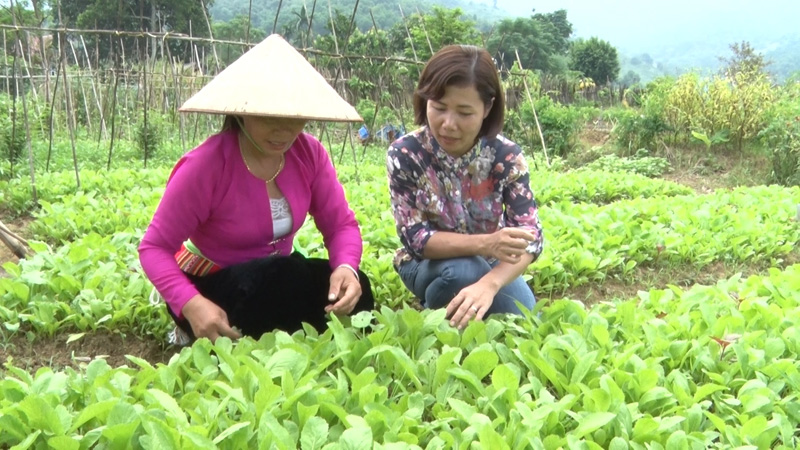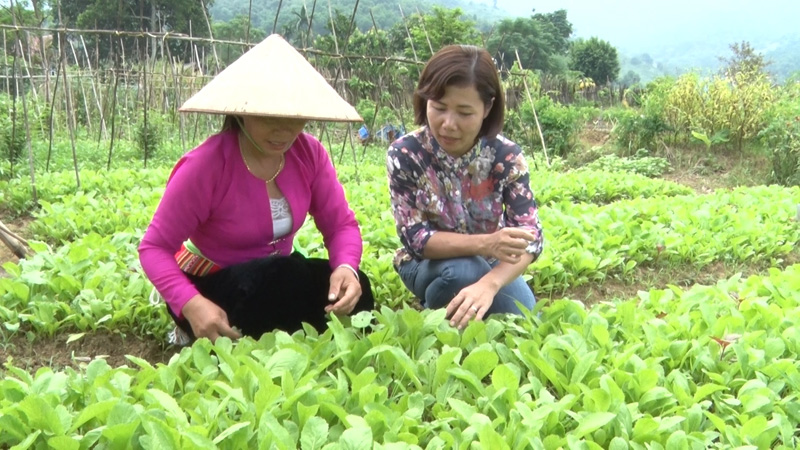
(HBO) - Growing vegetables under international standards without using pesticides or chemical fertilisers is a sustainable direction for farming households in Luong Son district, generating higher and more stable incomes.
After a decade of development, Luong Son organic
vegetable brand has become popular among consumers in Hoa Binh and Hanoi. With
over 200 ha of land and more than 200 tonnes of fruits and vegetables each year,
Luong Son has boasted the largest organic vegetable farming area in the
province.

Photo: Farmers in Hop Hoa commune, Luong Son
district, grow organic vegetables meeting food hygiene and safety standards.
Phung Thi Lan, Chairwoman of the Farmers' Association
and head of the district’s organic production group, said since late 2008, with
the support of the Danish-funded Agricultural Development Denmark Asia (ADDA)
project and the North of Vietnam College of Agriculture and Rural Development
in Xuan Mai district, Hanoi, the district has launched an organic vegetable
farming project in the communes of Hoa Son, Nhuan Trach, Hop Hoa, Thanh Lap, Cu
Yen, Tan Vinh and Luong Son town with an aim of creating more livelihoods for
poor women.
After a decade, it has become an outstanding
model for high-quality vegetable cultivation with little impacts on the
environment. It is significant to the district’s agricultural restructuring
scheme, thus raising incomes for local farmers, establishing a specialised farming
area for production in value chain, and supplying safe farm products to the
market.
In order to produce standard organic fruits and
vegetables, Luong Son farmers must take a three-month technical training course
and be granted certificates of organic vegetable farming. As many as 1,750 farmers
were trained and received such certificates from 2008 to June 2018.
Unlike conventional vegetable growing, land for
organic vegetable farming is zoned off and prevented from external
contamination via tests and buffer zones.
The total area of organic vegetable cultivation
in Luong Son has expanded to over 22ha, nearly 12ha of which meet international
standards. About 16 tonnes of safe and quality organic fruits and vegetables are
supplied to the market each month. Most of Luong Son organic fruits and
vegetables will be sold to shops and supermarkets in Hanoi via VinaGap, Trang
An and Tam Dat companies, bringing 3.4 billion VND in revenue per year./.
According to data from the Hoa Binh Provincial Party Committee, the industrial production index for the first six months of 2025 is estimated to have increased by 20% compared to the same period last year. This marks the highest year-on-year growth rate for this period since 2020.
In the first six months of 2025, Hoa Binh province’s export turnover was estimated at 1.145 billion USD, marking an 18.11% increase compared to the same period in 2024. Import turnover was estimated at $ 804 million, a 17.15% increase, which helped the province maintain a positive trade balance.
The lives of the ethnic minority farmers in Tan Lac district have gradually improved thanks to the new directions in agricultural production. This is a testament to the collective strength fostered through the professional associations and groups implemented by various levels of the district’s Farmers’ Union.
With the motto the "product quality comes first,” after nearly one year of establishment and operation, Muong village’s Clean Food Agricultural and Commercial Cooperative, located in Cau Hamlet, Hung Son Commune (Kim Boi district), has launched reputable, high-quality agricultural products to the market that are well-received by consumers. The products such as Muong village’s pork sausage, salt-cured chicken, and salt-cured pork hocks have gradually carved out a place in the market and they are on the path to obtaining the OCOP certification.
In the past, the phrase "bumper harvest, rock-bottom prices" was a familiar refrain for Vietnamese farmers engaged in fragmented, small-scale agriculture. But today, a new spirit is emerging across rural areas of Hoa Binh province - one of collaboration, organisation, and collective economic models that provide a stable foundation for production.
Maintaining growing area codes and packing facility codes in accordance with regulations is a mandatory requirement for agricultural products to be eligible for export. Recently, the Department of Agriculture and Environment of Hoa Binh province has intensified technical supervision of designated farming areas and packing facilities to safeguard the "green passport" that enables its products to access international markets.



